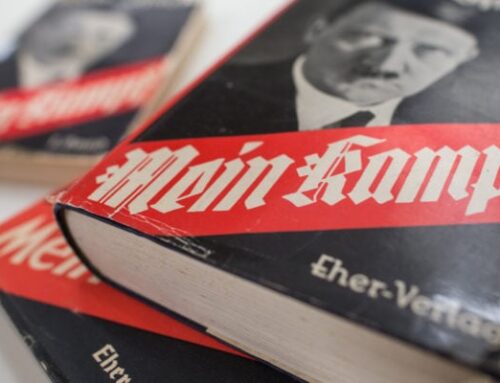In light of the subject matter of the excellent lesson from history from Mr. Victor Davis Hanson I am moved to include;
Why do the nations rage
and the peoples plot in vain?
The kings of the earth set themselves,
and the rulers take counsel together,
against the LORD and against his Anointed, saying,
“Let us burst their bonds apart
and cast away their cords from us.”
He who sits in the heavens laughs;
the Lord holds them in derision.
Then he will speak to them in his wrath,
and terrify them in his fury, saying
“As for me, I have set my King
on Zion, my holy hill.
I will tell of the decree:
The LORD said to me, “You are my Son;
today I have begotten you.
Ask of me, and I will make the nations your heritage,
and the ends of the earth your possession.
You shall break them with a rod of iron
and dash them in pieces like a potter’s vessel.”
Now therefore, O kings, be wise;
be warned, O rulers of the earth.
Serve the LORD with fear,
and rejoice with trembling.
Kiss the Son,
lest he be angry, and you perish in the way,
for his wrath is quickly kindled.
Blessed are all who take refuge in him.
Psalm 2
All the nations you have made shall come and worship before you, O Lord, and shall glorify your name.
Psalm 86:9
So if there is any encouragement in Christ, any comfort from love, any participation in the Spirit, any affection and sympathy, complete my joy by being of the same mind, having the same love, being in full accord and of one mind. Do nothing from selfish ambition or conceit, but in humility count others more significant than yourselves. Let each of you look not only to his own interests, but also to the interests of others. Have this mind among yourselves, which is yours in Christ Jesus, who, though he was in the form of God, did not count equality with God a thing to be grasped, but emptied himself, by taking the form of a servant, being born in the likeness of men. And being found in human form, he humbled himself by becoming obedient to the point of death, even death on a cross. Therefore God has highly exalted him and bestowed on him the name that is above every name, so that at the name of Jesus every knee should bow, in heaven and on earth and under the earth, and every tongue confess that Jesus Christ is Lord, to the glory of God the Father.
Philippians 2:1-11
“Therefore God has highly exalted him and bestowed on him the name that is above every name, so that at the name of Jesus every knee should bow, in heaven and on earth and under the earth, and every tongue confess that Jesus Christ is Lord, to the glory of God the Father.”
It bears repeating.
I can understand an individual outside of the experience of acknowledging Jesus as Lord, Lord of their life, of being aware and believing Jesus was fully truly a man while also being fully truly eternal God without beginning or end Who came to earth to die for the sin of the repentant, the contrite confessing their sin, and being renewed of mind and spirit to be a disciple of the Lord Jesus Christ living in fear of daily events. The history every person every moment of every day is part of. Part of making by their every action and word and taking in. No matter who no matter where. We’re all a part of the constantly developing history of these Biblical times.
Every person who is not a transformed by the Spirit of God disciple of the Lord Jesus Christ has faith in something, someone, other things, themselves, some object, or religion they have gravitated to devoid of Jesus, the Holy Bible absent from that faith believing what they hear and see in the pace of events occurring before us all is what is most important. Their idols and false gods receive their attention and faith. Adopting the fear this world creates. Adopting the anxiety. Believing what they are being fed by the world even as they proclaim they do not believe all the lies they have founded their lives on. That religion where the faith is placed can be anything. At odds with the God of the Christian and Jewish Bibles, opposed to Christ, being hollow inside and filled with darkness imagining themselves as the enlightened ones, the educated ones, the smart ones. The truly walking dead. Dead eyes. Dead hearts. Closed to the truth souls.
These folks make what occurs around this world we live on temporarily the most important matter. Ever. Every day. All the day and night long. Believing what the lost men and women, the lost nations they imagine greater than any other and invincible, always present in the future. Following and obeying all that only leads to despair, no real solution, and death. While declaring no need for the God of the Bible, no need for a Saviour, no belief in or need for the Holy Spirit. Or the Word of God.
Creating their own modern-day personal imperialism declaring themselves the authority, the ruler of themselves, they are empowered! They are their own god! Imperialism does not suddenly occur in a nation, or a state and become known. Imperialism is incubated and grows within the individual. Today many view themselves as the center of the universe or have such a bleak outlook they are dead inside, a vacuum where no moral compass, no good foundation has ever been laid to build upon.
Blessed is the man
who walks not in the counsel of the wicked,
nor stands in the way of sinners,
nor sits in the seat of scoffers;
but his delight is in the law of the LORD,
and on his law he meditates day and night.
He is like a tree
planted by streams of water
that yields its fruit in its season,
and its leaf does not wither.
In all that he does, he prospers.
The wicked are not so,
but are like chaff that the wind drives away.
Therefore the wicked will not stand in the judgment,
nor sinners in the congregation of the righteous;
for the LORD knows the way of the righteous,
but the way of the wicked will perish.
Psalm 1
Yep. The nations rage. The people plot in vain. They walk in the counsel of the wicked, stand aligned with sinners, and are seated with the scoffers.
They all are held in derision by the Lord.
Every knee will bow.
No matter what happens within America, worldwide, from this point in history until the moment the Lord Jesus Christ appears again, and He is returning a Second and Final time to this earth, it is what an individual does with that truth, that fact, the past, present, and future history contained in the Holy Bible, what a person does with regard to the way to eternal life, how a person views and approaches the throne of God, how a person approaches and believes Who Jesus Christ truly is, what He did, what He is doing, and that He is the only way to eternal life.
No matter what happens in America. No matter the outcome of any election. No matter what the Communist Chinese do, the Russians do, the Iranians do, and on and on, nation by nation. To the end.
For the end is known. Just get ahold of the Bible and discover. An easy to understand all that is most important Book, a pure, true Book that can transport any individual into past history, present, history, and future history more accurately and better than any time machine. For it is the Book of Truth leading one to the Lord and having their name written in the Book of Life.
Tyranny, fascism, socialism, communism, poverty, rebellion, famines, terror, wars and rumours of wars, strong divisions, great distress and suffering, Great Tribulation and persecution is here, has always been with us, and is coming greater than ever before in world history.
There is only one response to everything that happens here.
Turn to the Lord. Place all faith in Him. In all things. No matter what happens. Remain steadfast, secure, increasing in faith as the world erodes, rots, and gives up a stench as never before in world history — remain firm in the faith, contend for the faith, steadfast — to the end.
Which may be coming sooner than later…
And if one of the scoffers, deniers, unbelieving? Well, I hope and pray that if the Lord is calling to your presently rebellious, unbelieving heart and mind, that your heart begins to warm, to become inflamed with a desire for the Way to the Truth finding your way to the Light and the only way to Life — repenting, confessing sin, and asking the Lord Jesus Christ to be Lord of your life, acknowledging the power of the Holy Spirit to change your heart, change your mind, and change your life. From the inside outward.
And if a lukewarm, backsliding, nominal believer? It is time to catch fire for the Lord and ignite the flame of faith within you now. Without delay. This takes confessing, humbling, and obedience. Repenting and not having those feet on the path towards God wandering off course.
Read on.
Ken Pullen, A CROOKED PATH, Thursday, August 17th, 2023
Imperialism: Lessons From History
July/August 2023 Issue of Imprimis
by Victor Davis Hanson
The following is adapted from a talk delivered on the Regent Seven Seas Mariner on June 30, 2023, during a Hillsdale College educational cruise from Istanbul to Athens.
The word “imperialism” comes from the Latin word imperium. It refers to a nation or a state implanting its rule on other states, treating them as subordinates and in an inferior fashion. Some suggest today that America is behaving imperialistically—we do, after all, have some 600 military bases around the world. So it is worth recalling some historical examples of imperialism to understand what the idea entails.
Looking at empires through history, we can identify several things that most of them have in common. One is that their leaders often say or seem to believe that their imperialist policies have little to do with self-interest.
We can see an example of such denial in Pericles’ famous funeral oration as recorded in the second book of Thucydides’ history of the Peloponnesian War. The speech was delivered in 431 B.C., at the height of the Athenian Empire. Athens was expropriating tribute from its subject states and had built the Parthenon, the Propylaea, and soon the Erechtheion on the Acropolis. In other words, the Athenians were diverting a good portion of their allies’ tribute paid to them—which was supposed to be devoted to mutual defense—to enhancing their city. And what does the imperialist leader Pericles have to say of his grand visions? He calls Athens “the school of Hellas” and proclaims that it will enjoy “the admiration of the present and succeeding ages.”
Athens won’t need a poet like Homer to memorialize it, Pericles continues. Why? Because, he says, “we have forced every sea and land to be the highway of our daring, and everywhere, whether for evil or for good, have left imperishable monuments behind us.” In other words, Athens is proud of its mission to uplift the other Greek city-states—by force.
Likewise with the Roman Republic and Empire. Caesar went into Gaul in 58 B.C. and in a nine-year period killed perhaps one million Gauls and enslaved another million. And yet in Caesar’s Gallic Wars, and in later Roman literature, we read that Rome brought civilization to Gaul. The elite of Gaul were to wear purple togas, enjoy habeas corpus, and have aqueducts, so it was all for the good.
Similarly with sixteenth century imperialist Spain, which variously sent a force of 1,500 soldiers into Mexico in 1519 under Hernán Cortés. In two years they destroyed Tenochtitlán, ancient Mexico City, wiping out probably 200,000 people. And was the purpose to gain land, gold, and riches to help in the fight against Protestantism and Islam in Europe? Not exactly, according to Bernal Díaz, who was on the expedition. Rather it was more to convert souls to Christianity and to stamp out sodomy, cannibalism, and human sacrifice. To be sure, the conquest had these effects. But were the death and destruction really all for the sake of the conquered?
“The White Man’s Burden,” a long controversial poem by Rudyard Kipling, published in 1899, was addressed by a citizen of imperial England to the United States, which was currently fighting what many saw as an imperialist war in the Philippines. One of the poem’s stanzas reads, “Take up the White Man’s burden / In patience to abide / To veil the threat of terror / And check the show of pride / By open speech and simple / An hundred times made plain / To seek another’s profit / And work another’s gain.” This sense of duty sums up the common imperialist mindset: imperialism is a burden, undertaken reluctantly and for the good of the uncivilized. There is little self-serving about it.
Another trait empires have in common is obviously their dependence for enforcement on some type of superior military power—most often a navy. True, the Spartans controlled a land empire, as did the Soviet Union; but those empires were confined with self-imposed limitations. If a state becomes a naval power, as Alfred Thayer Mahan pointed out in his classic works on the influence of sea power on history, then it can move troops around to the rear of an enemy, impose boycotts, or modulate trade and supplies to help allies or hurt recalcitrant colonies.
The greatest empires have always been maritime. The Mediterranean, which the Romans referred to as mare nostrum or “our sea,” has been the seat of empires throughout history because of its geography—it is a convenient sea for imperialists in the middle of three land masses. The British Empire, of course, was entirely a result of British naval superiority.
A third characteristic empires share in common—perhaps the most interesting and thoughtworthy—is that for all the supposed advantages to be had through imperial rule, a historical case can be made that it has never quite penciled out. The costs of control seem to outweigh the benefits, even though—human nature being what it is—the imperialists tend to be oblivious to the expenses, perhaps because of the power and grandeur that come with empire.
One reason imperial policy seems superficially advantageous in terms of costs and benefits is the seduction of absolute power, as implied by the Caledonian (Scottish) nationalist Calgacus in 85 A.D. As recounted in Tacitus’s history, Calgacus complains of the Romans in addressing his troops: “To robbery, slaughter, plunder, they give the lying name of empire; they make a desert and call it peace.” In other words, if imperial powers can’t conquer a country and bring it into the fold peacefully, they wipe it out as a signal to others. So much for benefits to either the imperialist power or its subjects.
One corollary to the unprofitability of empire is that it tends to corrupt the character of the imperial power.
The Athenian Empire was based on the idealism of 180 subject city-states being offered the advantages of democracy. City-states conquered by Athens were required to become democracies—and what can be wrong with that?
But in 415 B.C., a large Athenian naval force went to the island of Melos and demanded that the Melians submit and begin paying tribute. Thucydides recounts what ensued, the famous Melian Dialogue, in the fifth book of his history: You’re either with us or against us, the Athenians threatened, and if you are against us we will destroy you. The Melians countered that they should be able to remain free and to maintain neutrality in Athens’ war with Sparta. The Athenians rejected the idea of neutrality. The Melians further argued that destroying Melos would result in anti-Athenian sentiment in Greece. The Athenians replied that it would instead result in fear and awe at Athens’ power. In the end, the Melians refused to submit. Following a siege, the Athenians massacred the adult men of Melos and enslaved the women and children.
As an aside, when I was 18 and just beginning my study of the classics, I was astonished when I read in Thucydides that when the Peloponnesian War broke out, most of the Greeks wanted Sparta to win. Was not Athens a democracy and Sparta an oligarchy? Athens was the home of Socrates, Pericles, Aeschylus, Aristophanes, and Sophocles. Sparta was rural and backward with no navy or beautiful temples or walls. It represented Doric severity as opposed to the Ionic cosmopolitanism of Athens. Why would the Greeks prefer that Sparta win? I didn’t understand the anomaly when I was 18, but the simple answer soon became clear: Sparta was not then imperial—or at least not as imperial as Athens. Empires like to think of themselves as having a lot of friends, but they are often naive in forgetting the depth of the ill-will they incur.
As if the destruction of Melos wasn’t enough to show the hubristic corruption of imperial Athens, the following summer, Athens sent a force of 40,000 troops to Syracuse to conquer or destroy the largest democracy in the Greek world. The Sicilian Expedition, as it came to be known, was a complete disaster. Thucydides says at the end of his seventh book, “they were destroyed, as the saying is, with a total destruction, their fleet, their army—everything was destroyed, and few out of many returned home.” For all practical purposes—although the Peloponnesian War would go on for another nine years—the Sicilian debacle marked the end of the Athenian Empire and illustrated the follies of unchecked imperialism.
It can be argued that the Roman Republic underwent a similar kind of imperial corruption. In historian Arnold Toynbee’s two-volume work, Hannibal’s Legacy, he argued that the period in which Rome fought the three Punic Wars—an era during which Rome achieved mastery of almost the entire Western Mediterranean—was ultimately calamitous for Rome because it undermined Rome’s republican habits, virtues, and character.
The Roman people, Toynbee argued, especially the independent yeoman farmers, were sent off for long periods to fight as legionaries in places like Spain and Numidia (present day Libya). Their places were taken by some two million slaves from conquered provinces who were shipped back to Italy. Huge amounts of money extracted from conquered lands poured into Italy and enriched an elite class, whose members consolidated the farms of the soldiers who were fighting abroad and forged them into large estates worked by slaves.
In time the troops overseas—whose successes had been due to the Italian virtues of hard work, independence, autonomy, and agrarianism that one sees emphasized in Virgil’s Eclogues and Georgics—became accustomed to plunder. When Carthage finally fell in 146 B.C., its population of 50,000 (down from 500,000) was enslaved, and the city was razed to its foundations. That same year the Romans looted and destroyed Corinth, the cultural capital of Greece.
The Rome of Virgil, Catullus, the younger Cato, and Cicero was now busy obliterating defeated cities that posed little threat to Rome’s security. The success that made Rome an empire, Toynbee argued, destroyed Rome by degrading the elements that made it great. Toynbee may not have been right in every respect, but there are certainly parts of his argument that ring true about corrupting the center through incorporating the periphery or diluting a republic by imperial ambitions.
This might remind us also of Britain, whose empire probably reached its peak sometime between 1850 and 1860. But if we read Charles Dickens’ Bleak House, published in 1852, we see that at the heart of the empire in London, there were vast numbers of people who were in poor-houses at the same time the country was spending its resources far and wide on its great imperial civilizing mission.
This in turn might make us think of present day San Francisco, where people are injecting themselves with drugs, fornicating, urinating, and defecating on the streets, and downtown businesses are closing in large numbers; or Chicago, where the murder and crime rates are making life there unbearable for so many. Our major cities are going to rot at the same time we are pledged to giving $120 billion to Ukraine, already making its military budget the third largest in the world.
And the decay goes beyond the large cities. Think of those gruesome scenes in East Palestine, Ohio, after the train crash that enveloped the town in a toxic chemical cloud. East Palestine is full of working-class people whom few of our establishment political leaders were willing to go visit. The people of East Palestine form the demographic that died at twice the numbers of the general population in our overseas wars in Iraq and Afghanistan. Yet few in our leadership class—many of whom had made one or more recent trips around the world to Ukraine to visit the Ukrainian people and pose for photos with Mr. Zelensky—went to East Palestine. I don’t know if one can properly call the United States an imperialist power, but this phenomenon of neglected and hollowed-out cores coupled with widespread overseas investments and commitments tends to be characteristic of empires.
Looking outward, we can see two clear manifestations of imperialism today. One is the Chinese brand of imperialism. China de facto now controls 15 of the major ports in the world—ports that the Chinese have leased, rebuilt, and refashioned. The Chinese are very farsighted, so these ports are not just random acquisitions. They control the Panama Canal. They monitor the entry into the Mediterranean at Tangiers and the exit at Port Said. The two largest ports in Europe, Antwerp and Rotterdam, are in the hands of the Chinese, as are the artificial islands in the South China Sea, a gateway for 50 percent of global oceanic traffic.
In other words, the Chinese control 15 points at which, in a global crisis, they will be able to shut off trade and access to commercial goods, oil, and food, not to mention the influence they have gained over local governments. China has also invested in concessions of rare earth mining, oil, and other natural resources in Africa. And due to the naive policies of the current U.S. administration, the Chinese are developing very close ties not only with Iran, but also with Saudi Arabia.
China today is creating something very much like the British Empire, although the Chinese are more like the imperialists of the Ottoman Empire than those of the British, in that they are neither apologetic nor shy about what they are doing. If the Chinese have an imperial enclave in Africa, they rope it off and don’t allow Africans nearby. Nor do they allow colonial peoples, for the most part, to go to Beijing and be educated or integrated. Like the Ottomans who conquered Constantinople in 1453, China has a monolithic culture and makes no apologies for its ambition to be a global imperial power.
The other imperial power we see on the rise today is more insidious. George Orwell’s nightmare dystopia in 1984 was a world in which there were no nation-states, but rather three powers wielding absolute control over three land masses into which everyone had been aggregated. Something like this is the dream of Klaus Schwab of the World Economic Forum and his fellow globalists (many of them American) who meet annually in Davos. Their vision is of a transnational ruling class, consisting of elites drawn mostly from the business, political, media, and academic worlds, with the power to issue edicts on climate change, public health, diversity, human rights, and even taxes, that override the will of national majorities.
If Chinese imperialism follows the tradition of the Ottoman Empire, the globalist vision of Davos imperialism is in the tradition of utopian empires gone astray. I think of Alexander the Great, who fought his first great battle with the Persians in 334 B.C. at Granicus on the coast of Asia Minor. When he died a decade later, he had probably killed over two million people in creating what he envisioned as an everlasting Hellenistic age based on an idea of the brotherhood of man. Alexander never thought of himself as a mere killer. He was an idealistic conqueror. And to this day, if you were to go to Greece and criticize Alexander, you would earn a hostile reaction. Alexander was an effective propagandist, as is the Davos crowd with their argument that the totalitarian rule they want to impose is for our benefit and the larger brotherhood of man.
Let me close by saying that in 1897, Rudyard Kipling was asked to present a poem at Queen Victoria’s Diamond Jubilee, marking her 60th year as queen. The British Empire, admittedly the most civilizing and humane of any empire in history, was in full bloom—it had 420 million people under its sway and covered 12 million square miles of territory, seven times the area of the Roman Empire. Kipling originally planned to present “The White Man’s Burden” at the event, but he decided instead to present “Recessional,” a bleak poem that includes this stanza: “Far-called, our navies melt away / On dune and headland sinks the fire / Lo, all our pomp of yesterday / Is one with Nineveh and Tyre / Judge of the Nations, spare us yet / Lest we forget—lest we forget!”
“Recessional” is a poem of lamentation in which Kipling, known to be a great supporter of the British Empire, seems to be warning that it is destined to fail. Maybe he had been studying history.







Leave a Reply, please --- thank you.